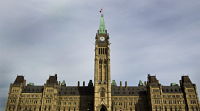
The federal government will balance its books in the 2015 federal budget this spring, despite continuing uncertainty about Canada’s economic outlook. In doing so, Ottawa seeks to fulfil promises it made during the previous federal campaign.
“[The government] is going to go to great, great lengths to find a way to balance the budget,” says Rick Robertson, associate professor with the Richard Ivey School of Business at the University of Western Ontario in London, Ont. “They can’t just make up the numbers, of course, but they’re going to try to find all sorts of things to get it done.”
However, the Toronto-based Investment Industry Association of Canada (IIAC) believes that Ottawa should consider giving priority to boosting the economy via tax incentives to investment in the Canadian small-business sector, even if that means delaying balancing the budget this year.
“Obviously, [budgeting] has to be managed carefully, but to run a deficit in this type of environment is not unprecedented,” says Ian Russell, the IIAC’s president and CEO.
In January, Minister of Finance Joe Oliver announced that a budget would not be brought forward before April, after the start of the new fiscal year, due to “market instability.” The delay – budgets typically are tabled in February or March – would allow the government more time to gather information before deciding how to proceed. Nevertheless, Oliver reiterated the government’s intention to balance its books this coming fiscal year.
In addition, Ottawa made a number of promises during the 2011 federal election campaign that were contingent upon returning to balanced budgets. Some of these promises, including income splitting for families in the form of the so-called “family tax cut,” have been delivered. Other promises – most notably, doubling the tax-free savings account’s annual contribution amount – have not.
Whether Ottawa can fulfil all of its promises will be contingent upon how much flexibility is left, considering the government has made balancing its books this year a priority. What is certain is that the government will try to craft a budget that allows the delivery of tax savings to Canadians while positioning the government as a prudent steward of the economy in preparation for election campaign mode.
“It’s an election year, so we should be looking for an election budget,” says Jamie Golombek, managing director of tax and estate planning with Canadian Imperial Bank of Commerce‘s wealth advisory services division. “It’s not a coincidence [the budget] was pushed out to April or May.”
The economic and fiscal outlook began to turn for the government in the last half of 2014, as oil prices endured a steep slide from more than US$110 a barrel last summer to a low of about US$45 a barrel in January before recovering modestly and stabilizing in February. In tandem, the value of the Canadian dollar relative to its U.S. counterpart fell dramatically. Most notably, the outlook for the global economy, and its appetite for Canadian resources, has remained uncertain.
Although the government may have delayed its budget in hopes that oil prices recover sufficiently to take some pressure off the fiscal outlook, the feds aren’t likely to be counting on such a scenario playing out, Robertson suggests.
Instead, Ottawa probably will be looking for strategic, and creative, cuts to spending, he says, or will announce deferring the fulfilment of promises until future fiscal years (and after the election): “[The feds] will ultimately hint, at minimum, that some of these things that were promised will be delivered, but only in [future budgets].”
The IIAC, for its part, argues that the Canadian economy would benefit from incentives for raising capital in the small-business and venture-capital sectors – a spur to what the IIAC says is desperately needed infrastructure investments. The IIAC is advocating for a rollover provision on capital gains taxes on assets sold if the proceeds are reinvested in the shares of small Canadian firms within six months of sale. The IIAC also is asking for the implementation of a tax-incentive program for emerging Canadian businesses, modelled upon a program in the U.K.
“We’ve gone through a long and unprecedented period of pent up demand [in the small-business and venture-capital sectors],” Russell says. “[With the IIAC’s proposed changes], here’s a real chance to stimulate investment in that direction.”
Other groups, such as policy think-tank Fraser Institute in Vancouver, also have argued for changes to rules governing the tax on capital gains, ranging from the deferral of capital gains taxes if assets are reinvested to the reduction or elimination of taxes on capital gains altogether. However, there are few indications that Ottawa will move in that direction.
“I don’t think that [suggestion] has any chance,” Golombek says. “Capital gains rates [at the current 50% inclusion rate] are already very low. And, although it’s certainly a noble suggestion and makes sense from an economic and financial perspective, it would be seen as a change that would primarily benefit the wealthy.”
Despite the change in economic outlook, financial services groups such as the Investment Funds Institute of Canada and the Canadian Life and Health Insurance Association Inc., both based in Toronto, are hoping that the government will give consideration to the recommendations submitted last August as part of the pre-budget process.
These recommendations range from changes to income-splitting rules governing income from RRSPs to introducing tax credits that encourage Canadians to purchase long-term care insurance.
© 2015 Investment Executive. All rights reserved.